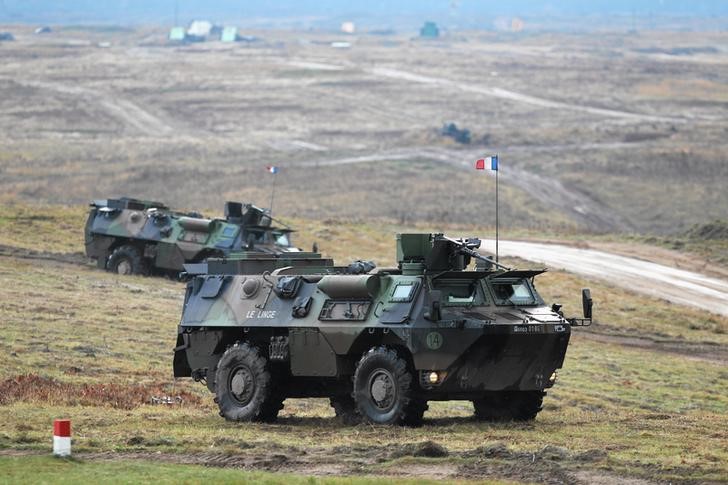* Only 4 European allies met 2 percent/GDP goal in 2017
* European allies boost spending by $11 bln y/y last year
* Europe under US pressure to spend more on own defence
By Robin Emmott
BRUSSELS, March 15 (Reuters) - NATO's European allies spent more on defence for the third year running in 2017 but their outlays failed to lift more countries above a target sought by the United States.
U.S. President Donald Trump has demanded allies dedicate 2 percent of national economic output on defence every year and has sought to keep up the pressure by calling that target, agreed at a NATO summit in 2014, a "bare minimum."
NATO's 2017 annual report showed Estonia, Greece, Poland and Britain met the 2 percent goal, the same group as in 2016, although alliance officials say Latvia, Lithuania and Romania will join them in 2018. NATO has 29 member states in total.
Russia's 2014 annexation of Crimea, failing states on NATO's borders, and the spread of Islamist militancy have pushed European governments to focus more on boosting their home defences after more than a decade of NATO-led operations in Afghanistan.
But the 2017 report may not be the breakthrough many NATO diplomats believe they need to mollify Trump, who as the alliance's de-facto leader has made defence spending a priority. He is expected to attend a summit at NATO headquarters in July.
In 2017, defence spending in Europe, including Turkey, rose 4.07 percent, or by $10.8 billion, compared to 2016, and marks a nearly $50-billion cumulative increase since spending began to increase in late-2014, the report said.
Overall, the NATO European allies and Canada combined spent an average of 1.45 percent of their economic output on defence in 2017, compared to 3.57 percent in the United States.
FEARS OF RUSSIA
After years of defence cuts following the Cold War, NATO Secretary-General Jens Stoltenberg said the shift in spending marks a significant change, as the alliance seeks to deter Russia and undergoes its biggest modernisation in decades.
"European allies and Canada are now stepping up," Stoltenberg told a news conference. "After years of declines, we are seeing three consecutive years of increases and more countries will meet the 2 percent target," he said.
Large spending increases in Bulgaria, which fears Russian dominance in the Black Sea region, in Germany, which is leading a battalion of NATO troops in the Baltic, and in Norway, which borders Russia, helped the numbers last year compared to 2016.
Even Spain, which is not among the big-spending eastern European nations worried about Moscow, raised defence expenditure by 18.25 percent in 2017 after a sharp fall in 2016.
But that spending did not keep pace with an economic recovery in Europe after years of crisis in the euro zone, and Spain remained well off the NATO target of reaching, or moving towards, 2 percent of gross domestic product by 2024.
Spending actually fell in Britain and Belgium, although in Britain's case the changes reflect fluctuations in the value of its pound currency, as the report is produced in U.S. dollars.
As its biggest contributor, the United States, has warned European allies since the 2008/09 financial crisis that the alliance's military power and influence are at risk while countries such as China and Russia increase their budgets.
